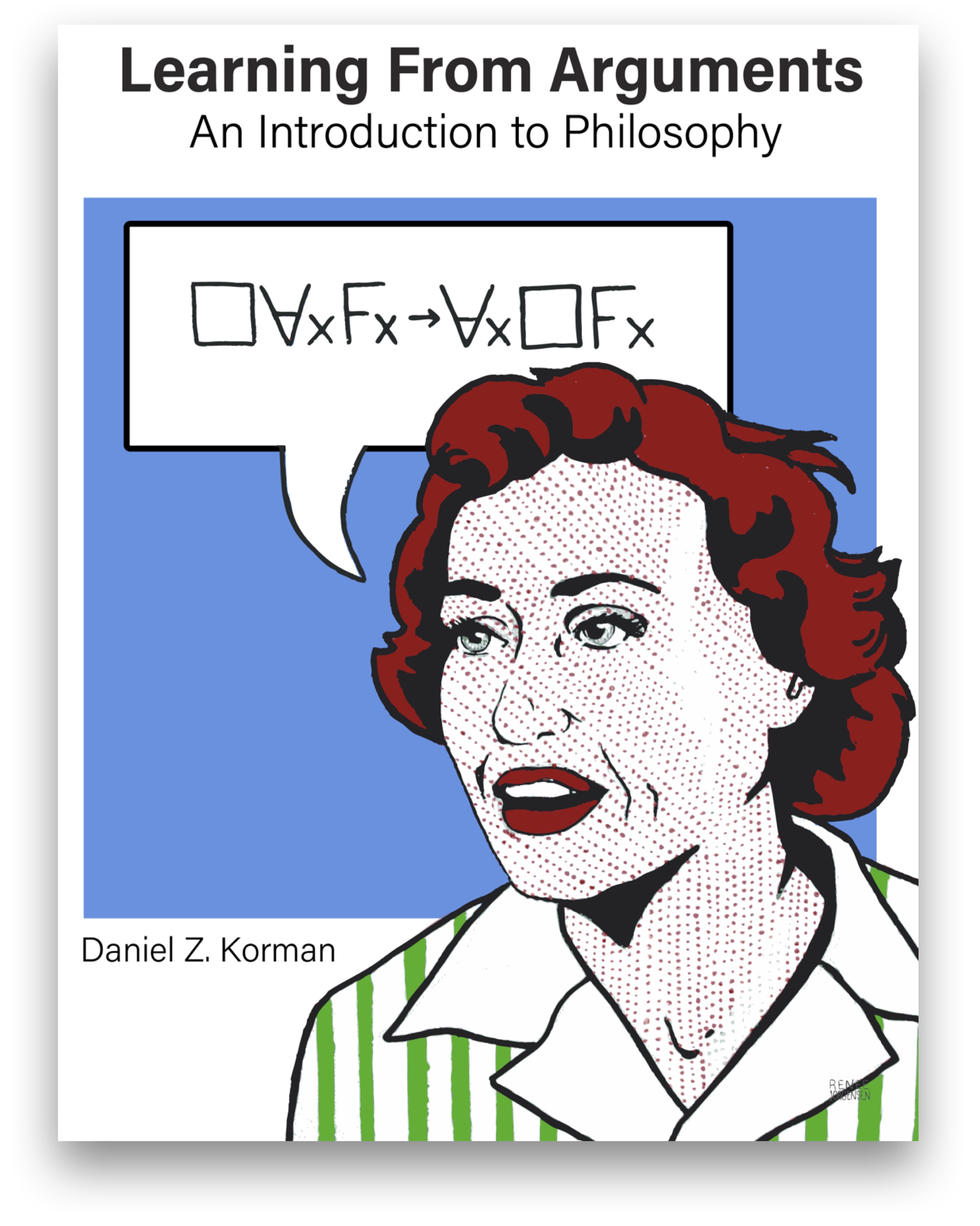
PHIL 1 — A Short Introduction to Philosophy — Spring 2025
Spring 2025 Syllabus and Schedule
Last updated 05/05/2025 — accessed:

Last updated 05/05/2025 — accessed:
Waitlist and Add Code Policy
NOTE: THIS VERSION OF THE SYLLABUS IS TENTATIVE AND WILL NOT BE FINALIZED UNTIL THE END OF THE FIRST FULL WEEK OF CLASSES.
Course Canvas site: https://ucsb.instructure.com/courses/26221
| Lecture Times/Location and Primary Instructor Information | |
|---|---|
|
(Prof.) Colin Allen
<colinallen@ucsb.edu>
|
|
| Teaching Assistants and Section Meeting Times/Locations | |

Keith Dyck <keithdyck@ucsb.edu> Sections: Mon 4:00-4:50 GIRV 2127 and Mon 7:00-7:50 GIRV 2116 Office hours: Mon 5:00-5:40 and 6:20-7:00 in South Hall 5705 |

Kerong Gao <keronggao@umail.ucsb.edu> Sections: Thu 12:00-12:50 ILP 4207 and Thu 1:00- 1:50 ILP 4207 Office hours: Wed 10:45-12:45 in SH 5721 |

Katherina Gontaryuk <kgontaryuk@ucsb.edu> Sections: Wed 5:00-5:50 ILP 4101 and Thu 9:00-9:50 ILP 4105 Office hours: Wed 11:00-12:00 in SH 5701 and by appointment |

Lee Hristienko <hristienko@ucsb.edu> Sections: Tue 9:00-9:50 ILP 4105 and Tue 5:00-5:50 ILP 4103 Office hours: Thu 3:00-5:00 in South Hall 5707 |

Wolfe Randall <rwrandall@ucsb.edu> Sections: Mon 12:00-12:50 ILP 4211 and Mon 2:00- 2:50 ILP 4205 Office hours: tba in SH 5702 and by appointment |
|
Course Description
This course exposes students to a sampling of topics addressed by philosophers, and provides an introduction to tools such as logic, definitions, counterexamples and thought experiments, that philosophers use to reason about complex and controversial claims.
Learning Objectives
By the end of the course, in addition to understanding the arguments that have been provided for and against prominent philosophical views, you are expected to be able to apply basic tools of argumentation, argument criticism, and conceptal clarification in your own writing about topics you have encountered in the class and to be able to apply these tools to examples of philosophical texts encountered for the first time.
Required Materials

The textbook is Learning from Arguments: An Introduction to Philosophy written by UCSB professor Daniel Korman. The book is provided free of charge through Canvas. It can also be downloaded free of charge at https://philarchive.org/rec/KORLFA. If you want a printed and bound paperback copy you can buy it for $6.36 at Amazon.
We will not be covering all the chapters in the book, nor will we do them in order. The order of reading is Introduction-1-2-5-3-6-8-9-10. You should also read Appendices 1 and 2 by the end of week 3 of the course.
A note on citing the textbook: Although it is written by Prof. Korman using the first person voice, the arguments presented in the text should not be assumed to reflect his actual views. So, if you cite the textbook you should not say, "According to Korman …" or "Korman says …" or similar. All the arguments in the book are named (e.g. The Body Swap Argument, The Doomed Regardless Argument). According, you should cite these arguments directly, like this "According to the Body Swap Argument (Korman 2022, p.60) …".
Course Format, Assessments, and Attendance
Mon/Wed lectures will highlight aspects of the readings, provide important context, and introduce more ideas about how to respond to the arguments presented in the textbook. Attendance at lectures will not be fully monitored but occasional quizzes delivered via iClicker will be available only to those in attendance at that lecture. One portion of the score for each quiz will reflect participation and another will reflect whether the question was answered correctly. At the end of the quarter, you will be forgiven up to two missed quizzes with no excuse necessary. If you miss more than this for excused absences please talk to me.
Discussion sections will elaborate and clarify the main topics and you will work on applying the argumentative and analytical tools used in philosophy to develop your own positions on the issues covered in lecture and the book. Policy for assessment of participation and attendance in sections is up to the individual TAs.
Concerning note-taking and studying styles, you are advised to read the following two articles from the cognitive science of learning.
TLDR: (1) taking notes on a keyboard is less effective than taking notes by hand; (2) practicing recall via repeated testing is more effective than re-reading for long term retention.
Grading Basis
Grades will be based on classroom quizzes administered in lectures (5% of the grade) and particiation in discussion sections (5% of grade), an in-person midterm exam on Monday April 28 (20%), a paper due by midnight on Thursday May 29 (35%), and an in-person final exam on Wednesday June 11 8-11 a.m. (35%). There is also an initial paper plan deadline on Thursday May 15 to allow you to receive feedback on the approach you will take.
Exact formats of the midterm and final exam will be announced one week before each exam, but you should be prepared to answer multiple choice and short-answer questions about anything in the assigned readings or covered in lectures and sections prior to the exam.
Paper prompts will be provided immediately after the midterm exam. Detailed instructions for writing and submitting your paper using Googledocs will be provided via Canvas.
Paper Grading and Late Paper Policy
Late papers will be penalized 5 points after the first 24 hours (i.e. receipt after midnight on Friday May 30), then one point per additional 24 hour delay. Late papers will not be accepted at all after Friday June 6.
iClicker Setup
Various aspects of class participation will require you to use iClicker on a mobile device or laptop. The iClicker link for the course is https://join.iclicker.com/XUFY. (See UCSB's iClicker Cloud for Students guide if you need detailed instructions on how to set up your device.)
Schedule of Readings, Topics, and Major Assignments
This reading schedule may be adjusted at any time. You will be alerted to changes via Canvas Announcements.
| Date | Topic | Readings / Assignments |
|---|---|---|
| Week 1 | ||
| Mon 03/31 | Welcome & Course Overview | |
| Wed 04/02 | The Problem of Evil | Appendix A + Ch 1, §§1-3 |
| Sections | Validity & Soundness of Arguments | Introduction §§1-4 + Appendix A §§1-2 |
| Week 2 | ||
| Mon 04/07 | The Problem of Evil | Ch1 §§4-8 |
| Wed 04/09 | Betting on God | Ch2 §§1-3 |
| Sections | Argumentative Strategies | Introduction §§5-7 |
| Week 3 | ||
| Mon 04/14 | Betting on God | Ch2 §§4-6 |
| Wed 04/16 | No Freedom? | Ch5 all §§ |
| Sections | Philosophical Writing / Philosophy of Religion | Appendix B §§1-2 / Chs 1 & 2 |
| Week 4 | ||
| Mon 04/21 | No Freedom? | Ch5 all §§ |
| Wed 04/23 | review | Chs. 1, 2 & 5, Appendices A and B, all lecture materials |
| Sections | Free Will + review | Chs. 1, 2 & 5, Appendices A and B, all lecture materials |
| Week 5 | ||
| Mon 04/28 | exam | MIDTERM EXAM |
| Wed 04/30 | What Makes You You? | Appendix B + Ch3 |
| Sections | Philosophical Writing | Appendix B §§3-4 |
| Week 6 | ||
| Mon 05/05 | What Makes You You? | Ch3 |
| Wed 05/07 | Do You Know Anything? | Ch6 |
| Sections | Writing + Metaphysics of Self | |
| Week 7 | ||
| Mon 05/12 | Do You Know Anything? | Ch6 |
| Wed 05/14 | Abortion Ethics | Ch8 |
| Thu 05/15 | PAPER PLAN DUE | |
| Sections | Writing + Epistemology | |
| Week 8 | ||
| Mon 05/19 | Abortion Ethics | Ch8 |
| Wed 05/21 | Should You Eat Animals? | Ch9 |
| Sections | Applied Ethics | |
| Week 9 | ||
| Mon 05/26 | Memorial Day | No class! |
| Wed 05/28 | Should You Eat Animals? | Ch9 |
| Thu 05/29 | PAPER DUE | |
| Sections | Metaethics | |
| Week 10 | ||
| Mon 06/02 | What Makes Things Right? | Ch10 |
| Wed 06/04 | What Makes Things Right? | Ch10 |
| Sections | Metaethics + review | |
| Finals Week | ||
| Wed 06/11 | Final exam | FINAL EXAM 8:00-11:00 a.m. |
Still Relatively New to Philosophy Courses?
Except in Logic (PHIL 183), you may find my concise guides to reading philosophy and writing philosophy helpful. You may find them useful even if you are not so new to philosophy.
Missed Assignments
Statement about Academic Misconduct
Students in this course are obliged to comply with UCSB's Academic Integrity Policies. Any student suspected of violating this obligation for any reason during the quarter will be referred via the Academic Integrity procedures detailed at the above link. When you submit assignments with your name on them in this course, you are signifying that the work contained therein is all yours, unless otherwise cited or referenced. Any ideas or materials taken from another source for either written or oral use must be fully acknowledged. If you are unsure about the expectations for completing an assignment or taking a test or exam, be sure to seek clarification beforehand. Use of ChatGPT or similar generative AI products will be discussed in prior to any writing assigments, and may not be used unless you are explicitly given permission to do so, and never without explicit acknowledgment of its use.
Diversity and Inclusion
The Americans with Disabilities Act (ADA) is a federal anti-discrimination statute that provides comprehensive civil rights protection for persons with disabilities. Among other things, this legislation requires that all students with disabilities be guaranteed a learning environment that provides for reasonable accommodation of their disabilities. If you have a disability for which you are or may be requesting an accommodation, you are encouraged to contact both your instructor and UCSB's Disabled Students Program for information about accomodations and services.
The University of California, in accordance with applicable federal and state laws and University policy, prohibits discrimination against or harassment of any person at the University on the basis of race, color, national origin, religion, sex, gender identity, pregnancy, physical or mental disability, medical condition (cancer-related or genetic characteristics), ancestry, marital status, sexual orientation, citizenship, or age. For more information see https://eodp.ucsb.edu/resources/policies.
I ask that everyone in the class strive to help ensure that other members of this class can learn in a supportive and respectful environment. If there are instances of the aforementioned issues, you may contact the Title IX Office, by calling 805-893-2701 or visiting https://titleix.ucsb.edu/. You may also choose to report this to a faculty/staff member; they may also be required to communicate about such issues to the University’s Office of Diversity and Incusion. If you wish to maintain complete confidentiality, you may also contact University Counseling & Psychological Services .
Statement on Classroom Recording
To ensure the free and open discussion of ideas, students may not record classroom lectures, discussion and/or activities without the advance written permission of the instructor, and any such recording properly approved in advance can be used solely for the student’s own private use.
Materials provided for the course may be protected by copyright. United States copyright law, 17 USC section 101, et seq., in addition to University policy and procedures, prohibit unauthorized duplication or retransmission of course materials. See Library of Congress Copyright Office and the University Copyright Policy.